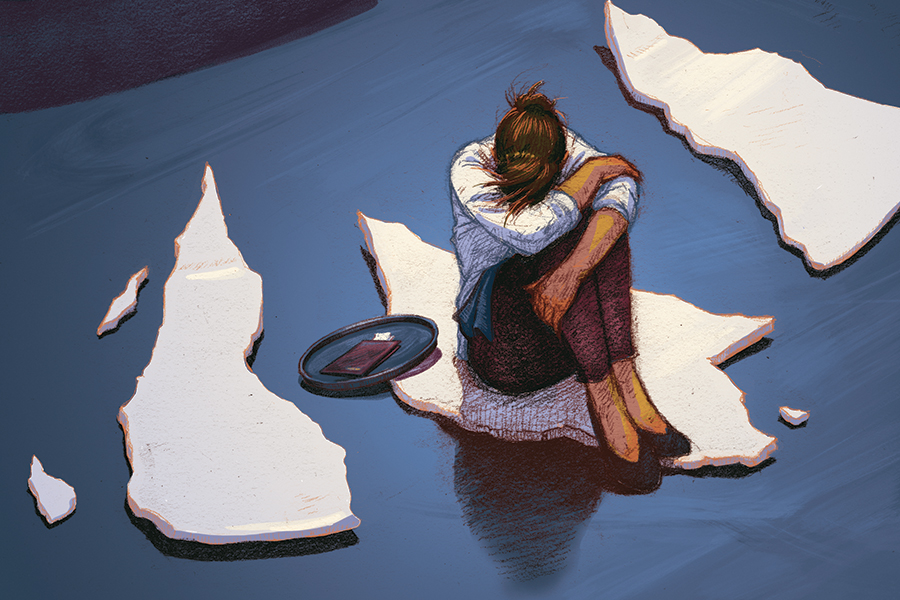(Not) At Your Service
How public-facing restaurant staff are faring in the high-stress, ever-evolving world of pandemic dining.

The pandemic was the final straw for her. She had been experiencing grief from prior miscarriages and she had channeled her energy into the restaurant to avoid acknowledging her issues.
“I worked for sixteen hours a day, every day, until the restaurant was built. We’d do the food truck, then go to the restaurant and vice versa, and sleep wasn’t really a thing,” she says.
She says she worked herself to the bone getting Rhody Roots up and running for opening in May 2019. After suffering one miscarriage, she became pregnant again, then lost that second pregnancy in January 2020. The coronavirus pandemic hit soon after.
“I was like that’s okay, I got this, this is just going to be temporary and we’re going to be fine. I put a big Band-Aid over it instead of dealing with the real stuff. Eventually, it just caught up to me,” she says. “I was forced to deal with reality because Governor Gina Raimondo made us shut down temporarily. She made us not able to work that crazy schedule we had. I don’t know if it’s a good thing or bad thing, because it’s made a lot of us have to look our demons in the face and deal with them because we were stuck with ourselves.”
Last spring, while she was doing takeout and curbside pickup only, Brimmer began plotting to end her life. She says she thought she was going to lose everything she had put into the restaurant.
“We are this culture of work ’til you die, and I couldn’t do that anymore, so my only way out was suicide. I was like I can’t cover this up; medicine isn’t working; therapy isn’t working. I was very sure I’d never be happy again,” she says. “I built this new restaurant. I put every ounce of everything emotionally and fiscally into this and it’s now getting ripped away from me and I haven’t even done anything. You look at yourself and say, ‘What could I have done differently?’ Well, nothing.”
Brimmer sent her nine-year-old son to school that day and planned to follow through with suicide, but in a desperate, hysterical moment, she texted her therapist.
“I was like, I can’t be the mom who kills herself and leaves this kid with no one,” she says. Her therapist and mother helped get her checked into a hospital and, later, she enrolled in Butler’s virtual group therapy program for women over Zoom. Along with being prescribed the right medication, she says the virtual therapy has helped her immensely.
“That program was the best thing I have ever done. I think everyone should do it,” Brimmer says. “It should be a high school course on how to cope with life. We are not taught that.”
Over and over, we’re told “it’s okay not to be okay,” but the next step is to ask for help and actually get it. The Rhode Island Hospitality Association saw the writing on the wall when the restaurant shutdown first went into effect last spring, and continues to help local hospitality workers more than a year later.
“I am not trained, but I do listen and I could cry right now. I could ball my eyes out because many people just need someone to talk to,” says Rhode Island Hospitality Association President Dale Venturini. “There’s a helplessness from people. This is an industry of people who are resilient. They are just hardcore. But they are now being challenged in a way they have never been challenged before without the tools to handle it.”
Starting last spring and continuing presently, Venturini and team began sending out weekly email blasts with mental health resources for hospitality workers. They encouraged restaurant owners to share mental health resources with their teams, regardless of the number of hours worked, including furloughed, seasonal, part-time and full-time employees. No health insurance is required.
Resources include the free mental health hub called Active Minds; the Sanvello app for stress, anxiety and depression with guided meditation, community discussion and tips; Ben’s Friends, a free hospitality-focused substance abuse support network; a crisis text line; and Optum’s Substance Use Disorder and Emotional Support helplines.
The RI Hospitality Association also helped create a website dedicated to supporting Rhode Island hospitality workers, hospitalitysupportri.orghospitalitysupportri.org, as well as a Facebook page for the community. It raised more than $200,000 for grants for the Rhode Island Hospitality Employee Relief Fund, and it continues to make resources available for navigating financial resources and mental health help, including leading virtual group discussions, so people know they are not alone.
“A lot of times, people don’t want to talk to their family or friends, because they don’t want to burden them with it,” Venturini says. “Sometimes having a resource that is anonymous, professional and trained to help makes it a lot easier for people to express some of things they are going through. There’s nothing wrong with wanting to get a little help because everyone is experiencing some trauma.”
Dr. Andrea, the social epidemiologist, is conducting interviews with food workers to learn more about their experiences during the pandemic and to identify workplace and policy-level strategies.
“A lot of these stressors are rooted in the financial impact, so if they are experiencing housing or food insecurity, locally, we have the Rhode Island Community Food Bank,” she says. “If they’ve got housing issues, we’ve got RI Housing, which might connect them with resources for dealing with eviction.”
To deal with stress, many hospitality professionals turn to exercise, yoga, meditation, unplugging from social media and reading. Brimmer at Rhody Roots has initiated staff hikes on local trails and she encourages employees to take mental health days if they need them.
“Even before this happened, I was open about my stuff because I always want everyone to feel they are not alone, and they can talk to people,” Brimmer says. “It’s important that we normalize mental health and we talk about that with the staff. It doesn’t make you bad, it just makes you different. Now they are very vocal about their stuff. I am like, “if you need time off, your mental health is just as important as your physical health.’”
For Andrew Kientz, taking mental health breaks out in nature is also essential. He’s a bartender, staff member and jack of all trades at Industrious Spirit Company [ISCO] in Providence and Bywater restaurant in Warren.
























